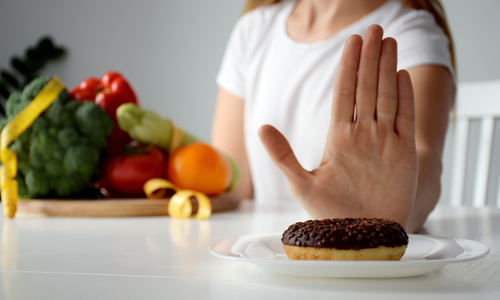Recovery Is Not All About Perfection With Food

Issue No. 36 | Brought to you by the Addiction Reset Community – ARC
Unlocking the secrets of processed food addiction and guiding you to find freedom from food and weight obsession.

One of the most common mistakes that people make in recovery from addiction to processed foods, is that they put too much emphasis on the food. This Is not to say that the food is not an important aspect of food addiction recovery - but getting the food perfect is not enough, on its own, or long-term abstinence and putting a severe food addiction into remission. In fact, the food is just 20% of the recovery equation.

Over several decades of dealing with an ever-worsening worldwide obesity and health crisis, much of the focus has been on how to perfect the food. People struggling with overeating, overweight or obesity have been told to just adjust or reduce their food intake or to simply cut calories. There has been a widespread belief, driven by the food and diet industries, that adjusting your food plan, would solve all your problems with food. That’s a myth!
This myth that food perfection is the key to control, has given rise to the damaging belief that if you cannot get perfect control over your food while following a defined food plan, it’s because you have gotten your food wrong. You must not be following the food plan correctly. Or that you lack willpower or commitment. The cycle of self-blame, shame and starting again and again to get your food right, is a painful process that aggravates food addiction more and more, the longer the cycle continues.

Admittedly, in recent years some “real food” meal plans are becoming more popular. Many people report successful weight loss and health improvements from any number of real food diets such as keto, plant-based, carnivore, paleo, Mediterranean and others. The reality is that these food plans may work to reverse obesity and improve health because they eliminate the hidden, addictive, harmful substances in food. Abstaining from addictive food substances like sugars, flour, excessive salt, processed fat, dairy and caffeine will go a long way in reversing obesity and improving health. But long-term adherence to those programs remains problematic if the focus is solely on the food.
For most people, knowledge about what to eat, what not to eat, how to prepare food, how much to eat and when to eat - is simply not enough to avoid relapse or to achieve long-term abstinence from processed foods.
The other 80% of recovery is about managing triggers and cues. We face thousands of addiction triggers daily. These are not limited to food cues only but extend to triggering situations, relationships, emotions, social interactions, events and many more. Management of triggers and cues in every aspect of your life is critical to recovery. Without these important pieces of the recovery puzzle, getting your food right may be extremely difficult, if not impossible.
Being imperfect with your food while trying your best to adhere to a clean food meal plan is not your fault. It is the result of a severe addiction that requires support that extends way beyond a food plan. Recovery from processed food addiction requires immersion into a recovery support community that promotes abstinence from addictive foods - while focusing on retraining addicted brain cells and building skills to manage triggers and cues.


Within the Addiction Reset Community (ARC) our members and their journeys are important to us. We find their stories inspiring and hopeful for everybody in health recovery.
“After a few weeks of being in the ARC I have finally figured out why this feels like the right place for me. I FINALLY feel like I’m seen and heard. I’m 62 years old and I have been trying to make my Doctors, family and friends understand my struggle with food for many years. I’ve secretly suspected that I had an addiction but I was too ashamed to say that to anyone. Actually, before I came across Joan’s YouTube videos, I had no idea that this was even a real diagnosable addiction.
In the ARC, I am with people who understand my story. When I listen to other members’ shares in the chats, I often think “Oh my goodness! That’s exactly like me!” And when I hear their wins and stories of transformation, I believe that it is possible for me too. It’s still early days and my food is by no means perfect but I am already noticing significant changes in my thoughts about food and about myself. I’m looking forward to what the future holds for me here in the ARC."

Many people reach out to Joan asking for advice and assistance on how they can begin their recovery journey.
Dear Joan,
I have seen the destruction first-hand of what happens when sugar and cancer mix. My loved one had a diet of baked goods, caffeine, and artificial sweeteners. Her cancer spread to her spine and brain. It is likely those items contributed to the growth and spread of the disease?
Joan responds:
Research shows that processed foods are associated with cancer. Some cancer cells multiply by feeding on sugar. These cancer cells have insulin receptors. So when sugar is too high in the blood, insulin is released to bring it down to a safe level. Insulin travels to muscle and fat cells to trigger those cells to open up and take in glucose. If cancer cells with insulin receptors are present, they will receive glucose which encourages the cancer cell to multiply.
DISCLAIMER:
Dr Joan Ifland (PhD) is a global expert on the subject of processed food addiction and is not a medical doctor. Information and response shared in this Newsletter are not intended for, and should not be construed as medical advice.
Do you have a question? Reach out to us with your questions about food addiction and recovery at gethelp@foodaddictionreset.com
Are you showing signs of Processed Food Addiction? Take this self-quiz to find out now!
Recent copies of Dr Joan Ifland's Blog:
Issue 01 | Issue 02 | Issue 03 | Issue 04 | Issue 05 | Issue 06 | Issue 07 | Issue 08 | Issue 09 | Issue 10 | Issue 11 | Issue 12 | Issue 13 | Issue 14 | Issue 15 | Issue 16 | Issue 17 | Issue 18 | Issue 19 | Issue 20 | Issue 21 | Issue 22 | Issue 23 | Issue 24 | Issue 25 | Issue 26 | Issue 27 | Issue 28 | Issue 29 | Issue 30 | Issue 31 | Issue 32 | Issue 33 | Issue 34 | Issue 35


